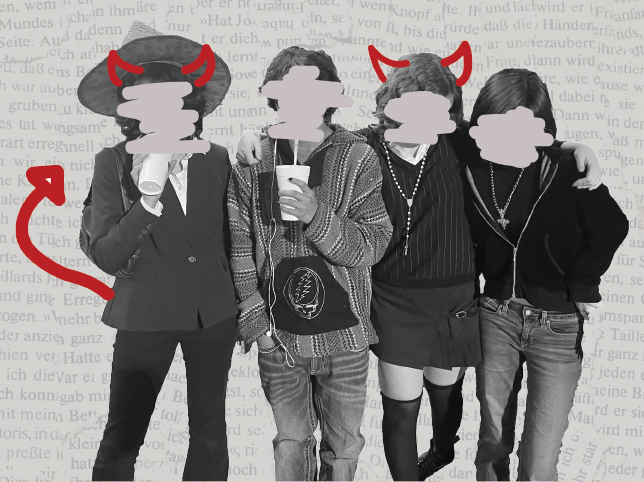Am I the villain?
Setting healthy boundaries and being assertive should not be synonymous with being a “villain.”
You don’t have to be a “villain” to be direct.
A slick black cape drags along the floor behind them, and a long dark wooden staff glows green and clicks with every step. Their eyes are piercing, and their jawline is sharp. They possess a devilish smirk and clench a rotten apple dripping with poison.
This mystical scene is what I imagine for someone who’s in their “villain era.” However, this term stems from a trend that started on TikTok and is used to signify an era of setting boundaries in relationships, being assertive and prioritizing oneself, which can sometimes elicit negative reactions from others.
I’ve used the phrase “villain era” several times within the past year while shifting the way I handle situations. Actually bringing up the issues I had with people? So evil of me. Setting boundaries? How cruel. Cutting out unhealthy relationships? Just plain ruthless.
In those moments, I truly did feel the need to put myself into the mindset of a villain in order to speak up. Characterizing myself as a bad guy was the only way I could justify standing up for myself.
Once I started therapy, my perception of what healthy relationships are was turned upside down. What I once thought were actions of a good person — always listening to others’ issues, saying “yes” to everything, prioritizing others’ needs and feeling guilt for doing anything for myself — might be favorable for others, but are not always beneficial nor fair to me. Changing my seemingly good behaviors to help myself meant releasing the fear I had of being a bad person — being the villain.
The more I thought about my apparent “villain era,” the more I questioned it: why should I consider myself a villain when I’m finally handling matters in a healthy manner?
Calling those choices a “villain era” characterizes healthy behaviors — being direct and setting boundaries — as bad. I have found that the people who struggle with doing these things for themselves most often grew up in an environment where they sought external validation to determine their self-worth. This trait can carry on after childhood and result in chronic people-pleasers, like myself. If people are already worried that they’ll be considered a bad person for setting boundaries, it’s detrimental to refer to their actions as villainous.
However, when you make these changes, others might view you differently or like a villain. People aren’t used to you standing up for yourself, but that’s not your problem. You’re not being a villain; they’re being immature. Calling it a “villain era” makes it seem like you’re the one in the wrong.
The issue with the term “villain era” worsens when you consider that most often, it’s assertive feminine-presenting people using or being referred to with this phrase. We’ve been regarded as “less assertive” for a long time. Breaking out of this mold is important, but it shouldn’t have negative connotations attached to it. Feminine-presenting people are villainized enough as is. For example, a Harvard Business Review study found when asked to describe men and women who are in leadership positions, participants assigned women significantly more negative traits. Words assigned to women included “inept,” “frivolous,” “passive” and “gossip” while men were deemed only “arrogant” and “irresponsible.” As for positive traits, participants gave women positive attributes like “compassionate” and “enthusiastic” while men were “analytical,” “competent,” “confident” and “level-headed.”
When people who aren’t men display masculine traits, society reverts to simply describing them as evil. Growing up as a confident and assertive, feminine-presenting person, I was always called “bossy.” Perhaps I really was bossy and overbearing, but when boys spoke and acted the same way as me, such as lead group projects, they were called “leaders” instead.
Why are we described as “bossy” while men are called “leaders?” Why are we “overdramatic” while men are “rightfully upset?” Why are we “shrewd” while men are “strategic?” Why are we being “villainous” while men are being “assertive?” We can never win, no matter how we act. It’s no surprise that people often refer to non-men as being in their villain era when they decide to exercise their personal power.
Assertiveness and confidence should be normal for everyone, no matter what their gender identity is. We must continue to destigmatize setting boundaries and taking care of our mental health. According to the National Alliance on Mental Illness, or NAMI, some of the most important parts of removing stigmas are talking openly, educating yourself and others, being conscious of your language and being honest.
Take time to reflect on your own life and what boundaries you need by taking into account what drains your energy or causes you extra stress versus what makes you feel supported. Write it down on a piece of paper and draw a line as a physical boundary between these categories: when you’re able to acknowledge and accept the boundaries you need, it’s easier to communicate them to others. Speak kindly and concisely without placing blame on anyone, but do not waver. If you are too exhausted to do something, say, “I don’t have the energy to help you with this right now.” If you’re not in a place for someone to vent to you, say, “I want to be here for you during this hard time, but I don’t have the mental capacity to listen right now; is there any other way I can help?”
Remember you don’t need to apologize or explain your boundaries. Whether they surround emotional energy, social media, time or personal space, your boundaries should be honored. If people can respect a “No Trespassing” sign, they can respect the feelings of someone they care about.
While the term itself has a negative connotation, the actions a “villain era” stands for are positive and reasonable. In reality, they are normal, healthy behaviors that should not be villainized nor promoted as such. The most important thing we can do to remove these stigmas is to flip the script and remind ourselves that these manners are mature and should not be frowned upon. You don’t owe anyone anything, and you deserve to be respected. Protect your peace, own your time, say “no” to things that don’t serve you and prioritize yourself without the need to call yourself a villain. You can be empowered without poisoning an apple or becoming a bad apple yourself.
Your donation will support the student journalists of West High School. Your contribution will allow us to purchase Scholarship Yearbooks, newsroom equipment and cover our annual website hosting costs.

(they/them) Katherine Shoppa is a senior in high school and this is their third year on staff. They are the Co-Editor-in-Chief of the...

(they/she) Defne Bayman is a senior this year, and has been on Print for two years and joined Web this year. They are the communications manager for all...



